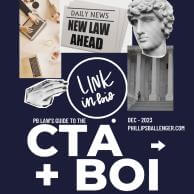DIY Estate Planning?? In the information age, you can pretty much learn how to do just about any household task- watch a video on YouTube to learn how to build a bookshelf, read one of the thousands of DIY blogs to learn how to install a sprinkler set, or refinish a dresser. With the…
Continue reading…
PB Law Attorneys named to Top Rank Attorneys in Nevada list!
We’re excited to announce that Phillips Ballenger’s estate attorneys, Tiffany Ballenger Floyd and Katarina J. Arthur, were both named to Nevada Business Magazine‘s Nevada Top Rank Attorneys list.
Continue reading…
Nevada Asset Protection Corporate Veil – Does it Really Protect Your Personal Assets?
Most business owners understand the importance of keeping your business separate from your personal estate. You may have done your homework and weighed your options. Perhaps you’ve even considered the tax and non-tax implications for common business entities. We bet you’re also intrigued by the protections certain business entities (such as Nevada LLCs) afford their…
Continue reading…Trump Tariffs: What They Mean for Your Wallet (and is a Recession on the Horizon?)
Let’s talk tariffs. Yep—those taxes on imported goods that made headlines a few years ago during the Trump administration. While they may sound like a topic reserved for economists and politicians, tariffs have had some very real, very tangible effects on everyday Americans—and could still be contributing to broader economic uncertainty today. Wait—Remind Me What…
Continue reading…
Another Update on the BOI/CTA Fiasco…
Latest update as of March 3, 2025: On March 2, 2025, the US Treasury Department announced that not only will it not impose penalties or fines under the current regulatory deadlines, but it will also not enforce any penalties or fines against U.S. citizens or domestic reporting companies or their beneficial owners after the forthcoming rule changes take…
Continue reading…
Urgent Update – Corporate Transparency Act (CTA) Reporting Requirements BACK in EFFECT (for now…)
⚠️ CTA Reporting Rule Update – Legal Battle & New Deadlines! ⚠️ The Corporate Transparency Act (CTA) Beneficial Ownership Information (BOI) Reporting Rule is back in play, but the legal fight isn’t over. Here’s what business owners need to know: What Does This Mean? 📅 Key Dates to Watch: ⚖️ Potential Legislative Changes 🚨 Take Action: This situation is evolving—stay tuned for…
Continue reading…
(Another) Update – The CTA Saga Continues…
This week brought further developments related to the legal challenge to the Corporate Transparency Act (“CTA”) and its Beneficial Ownership Information Report (“BOIR”) filing obligations. We understand how confusing and frustrating this back-and-forth can be for business owners and their advisors, and we’re committed to keeping you informed. Per FinCEN Alert, 01/02/2025: “In light of…
Continue reading…
(Another) Update – The CTA Saga Continues…
This week brought further developments related to the legal challenge to the Corporate Transparency Act (“CTA”) and its Beneficial Ownership Information Report (“BOIR”) filing obligations. We understand how confusing and frustrating this back-and-forth can be for business owners and their advisors, and we’re committed to keeping you informed. Updates as of 12/26/2024: On December 23,…
Continue reading…
Important Update! BOI/CTA – Corporate Transparency Act (CTA) Reporting Requirements Paused (for now…)
The Corporate Transparency Act (CTA) is designed to increase transparency and combat financial crimes by requiring many U.S. companies to report their beneficial ownership information (“BOI”) to the Financial Crimes Enforcement Network (FinCEN). However, a recent legal action has temporarily paused these requirements… What Happened? In early December, a federal court in Texas issued a nationwide preliminary injunction,…
Continue reading…

